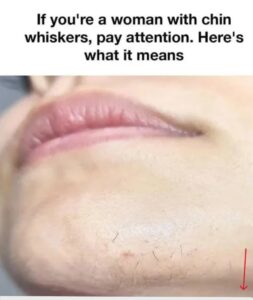Chin Whiskers in Women: What You Need to Know

Many women are surprised when they notice whisker-like hairs sprouting on their chin. While often seen as an embarrassing issue, chin hairs are far more common than most people realize. They can vary from soft, light strands to thicker, darker hairs and may appear in small numbers or as more noticeable growth. Understanding why these hairs develop can make them easier to manage and less stressful to live with.
Why Do Chin Whiskers Appear?
Like every hair on the body, chin hairs follow a growth cycle that includes the anagen (growth), catagen (transition), and telogen (resting) phases. The key players in stimulating hair growth are hormones called androgens, which include testosterone. Women naturally produce small amounts of these hormones, but if the balance shifts or the body becomes more sensitive to them, facial hair can become more visible. Genetics also influence how many hair follicles are present in a given area, meaning some women are naturally more prone to whiskers.
Hormonal Triggers
Hormonal fluctuations are one of the most common reasons women experience chin whiskers:
-
PCOS (Polycystic Ovary Syndrome): This condition often increases androgen levels, leading to excess facial hair, acne, and irregular cycles.
-
Menopause: As estrogen declines, the balance of hormones changes, sometimes resulting in more noticeable chin hair.
-
Medications: Birth control pills and certain hormone-affecting treatments can also shift growth patterns.
Genetic and Ethnic Influences
Family history plays a big role in whether chin whiskers develop. If your mother or grandmother had them, chances are you might as well. Ethnicity also matters—women of Mediterranean, Middle Eastern, and South Asian backgrounds often experience thicker or more visible facial hair due to genetic traits.
Possible Medical Concerns
While most chin hair is harmless, sudden or excessive growth may signal an underlying issue such as:
-
PCOS
-
Adrenal gland disorders
-
Cushing’s syndrome
-
Certain tumors that affect hormone production
-
Hypothyroidism
If you notice rapid changes along with other symptoms like irregular periods, weight gain, or acne, it’s best to consult a doctor.
Emotional and Psychological Impact
For many women, chin whiskers are more than a cosmetic nuisance. They can lead to:
-
Embarrassment and self-consciousness
-
Anxiety over appearance
-
Avoidance of social situations
-
Negative body image and low self-esteem
-
Obsessive grooming habits
-
Fear of hidden health problems
-
Depression or heightened stress
Because beauty standards often emphasize smooth, hair-free skin, women may feel pressured to remove facial hair constantly, which can become emotionally exhausting.
Cultural Views
Society and media often label female facial hair as “unfeminine,” which magnifies the stigma. However, attitudes are slowly shifting. Conversations about body positivity and natural beauty are helping some women feel more comfortable embracing chin whiskers rather than hiding them.
Management and Treatment Options
Women who want to reduce chin whiskers have many options:
-
Temporary: Plucking, waxing, shaving, depilatory creams
-
Longer-lasting: Laser hair removal, electrolysis
-
Medical: Prescription creams like eflornithine, which can slow growth
Always consider skin sensitivity before trying a method, and consult a dermatologist if irritation occurs.
Lifestyle and Natural Remedies
Certain lifestyle habits may help reduce or balance chin hair growth:
-
Maintaining a healthy weight to regulate hormones
-
Eating a balanced diet rich in fruits, vegetables, and whole grains
-
Drinking spearmint tea, which may have mild anti-androgen effects
-
Practicing stress management through yoga, meditation, or mindfulness
Final Thoughts
Chin whiskers are a normal part of life for countless women. While they can cause distress, understanding the causes—and the wide range of treatment options—can make them easier to manage. Whether you decide to remove them or embrace them, the key is to prioritize your comfort and confidence. Remember, you’re not alone, and support is available both medically and socially.